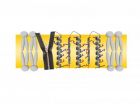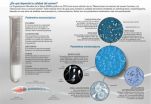(Press-News.org) Employees often tiptoe around their bosses for fear of offending them. But new research from the University of California, Berkeley, shows people in power have thicker skin than one might think.
A UC Berkeley study has found that people in authority positions – whether at home or in the workplace - are quicker to recover from mild rejection, and will seek out social bonding opportunities even if they've been rebuffed.
"Powerful people appear to be better at dealing with the slings and arrows of social life, they're more buffered from the negative feelings that rejection typically elicits," said Maya Kuehn, a doctoral student in psychology at UC Berkeley and lead author of the study. She will present her findings this Friday, Jan. 18, at the annual conference of the Society for Personality and Social Psychology in New Orleans.
Kuehn and her fellow researchers conducted five experiments that examined power dynamics in workplace and in intimate relationships, focusing on how power influences responses to subtle acts of rejection. A total of 445 men and women between ages 18 and 82 participated in the study.
In one experiment, participants were assigned either high- or low-level positions in a workplace, then told they hadn't been invited to an office happy hour gathering. While low-level employees reported feeling stung by this rejection, the high-power ones were relatively unfazed and more likely to seek out other social bonding activities, such as a hiking club, to improve relations with their coworkers.
In another experiment, participants were told they would be working with someone in either a supervisory or a subordinate role. They corresponded with that person and received feedback that could be perceived as a snub or mild rejection. Those who had been assigned supervisory roles acted with indifference to perceived snubs from their underlings while subordinates took offense to comparable barbs from their bosses.
"When rejected instead of accepted, subordinates reported lower self-esteem and greater negative emotion, but supervisors did not show an adverse reaction to rejection," Kuehn said.
A similar power dynamic played out in an experiment involving romantic partners. Couples were brought into a lab setting and videotaped discussing problem-solving tasks, such as what to do if an airplane they were on crashed in the wilderness. Before these discussions, couples had rated each other in terms of who held the most power in their real-life relationships, and how responsive their partners had been to their needs that day.
The study found that the partners who perceived themselves as less powerful were less positive during the videotaped discussion when working on a solution with their mate. By comparison, the more dominant partners acted more upbeat and worked harder at connecting and getting their mates on their side.
###
Other co-authors of the study are UC Berkeley psychologists Serena Chen and Amie Gordon.
Powerful people better at shaking off rebuffs, bonding with others
UC Berkeley study finds authority figures deal well with mild rejection
2013-01-18
ELSE PRESS RELEASES FROM THIS DATE:
Physical and sexual assault linked to increased suicide risk in military
2013-01-18
According to results of a new study by researchers at the University of Utah, military personnel experience increased risk of suicidal thoughts or actions if they were the victims of physical or violent sexual assault as adults. In contrast, undergraduate students experience increased risk of suicidal thoughts or actions if they were the victims of unwanted sexual experiences as children or adults.
While other research has shown that victims of sexual or physical assault are at increased risk of health problems—including suicide—the majority of that work has focused on ...
Melt ponds cause the Artic sea ice to melt more rapidly
2013-01-18
The Arctic sea ice has not only declined over the past decade but has also become distinctly thinner and younger. Researchers are now observing mainly thin, first-year ice floes which are extensively covered with melt ponds in the summer months where once metre-thick, multi-year ice used to float. Sea ice physicists at the Alfred Wegener Institute, Helmholtz Centre for Polar and Marine Research (AWI), have now measured the light transmission through the Arctic sea ice for the first time on a large scale, enabling them to quantify consequences of this change. They come to ...
Which nutritional factors help preserve muscle mass, strength and performance in seniors?
2013-01-18
January 17, 2013--Nyon, Switzerland
Sarcopenia, or the gradual loss of muscle mass, is a common consequence of ageing, and poses a significant risk factor for disability in older adults. As muscle strength plays an important role in the tendency to fall, sarcopenia leads to an increased risk of fractures and other injuries.
The International Osteoporosis Foundation (IOF) Nutrition Working Group has published a new review which identifies nutritional factors that contribute to loss of muscle mass, or conversely, are beneficial to the maintenance of muscle mass. The Group ...
Cell: Protein folding via charge zippers
2013-01-18
This press release is available in German.
Membrane proteins are the "molecular machines" in biological cell envelopes. They control diverse processes, such as the transport of molecules across the lipid membrane, signal transduction, and photosynthesis. Their shape, i.e. folding of the molecules, plays a decisive role in the formation of, e.g., pores in the cell membrane. In the Cell magazine, researchers of Karlsruhe Institute of Technology and the University of Cagliari are now reporting a novel charge zipper principle used by proteins to form functional units ...
The cell that isn't
2013-01-18
This may look like yet another video of a dividing cell, but there's a catch. You are looking at chromosomes (red) being pulled apart by the mitotic spindle (green), but it's not a cell, because there's no cell membrane. Like a child sucking an egg out of its shell, Ivo Telley from the European Molecular Biology Laboratory (EMBL) in Heidelberg, Germany, removed these cellular 'innards' from a fruit fly embryo, at a stage when it is essentially a sac full of membrane-less 'cells' that divide and divide without building physical barriers to separate themselves from each other.
"It's ...
Increasing concerns surrounding surrogacy
2013-01-18
COUPLES seeking to build a family, and surrogate mothers overseas who help them, are in danger of emotional, physical and financial exploitation unless UK authorities monitor and regulate the field much more closely, according to a University of Huddersfield professor who has published the results of a detailed investigation.
Eric Blyth – Professor of Social Work at the University of Huddersfield, and based at its Centre for Applied Childhood Studies – is co-author of The changing face of surrogacy in the UK, an article which charts the rapid increase in the numbers of ...
Semen quality of young men in south-east Spain down by 38 percent in the last decade
2013-01-18
The first comparative study on the evolution of sperm quality in young Spanish men over ten years, headed by researchers at the University of Murcia, reveals that spermatozoid concentration in men between 18 and 23 years in the regions of Murcia and Almeria has dropped by an annual average of 2%.
The suspicion that the semen of Spanish men is losing quality now takes force in the case of young men from Murcia and Almeria.
The 'Andrology' journal has published a multidisciplinary and international study, headed by the Department of Preventative Medicine and Public ...
Unrestricted access to the details of deadly eruptions
2013-01-18
Volcanic eruptions have the potential to cause loss of life, disrupt air traffic, impact climate, and significantly alter the surrounding landscape. Knowledge of the past behaviours of volcanoes is key to producing risk assessments of the hazards of modern explosive events.
The open access database of Large Magnitude Explosive Eruptions (LaMEVE) will provide this crucial information to researchers, civil authorities and the general public alike.
Compiled by an international team headed by Dr Sian Crosweller from the Bristol's School of Earth Sciences with support from ...
Breakthrough for solar cell research
2013-01-18
In the latest issue of Science, researchers from Lund University in Sweden have shown how nanowires could pave the way for more efficient and cheaper solar cells.
"Our findings are the first to show that it really is possible to use nanowires to manufacture solar cells", says Magnus Borgström, a researcher in semiconductor physics and the principal author.
Research on solar cell nanowires is on the rise globally. Until now the unattained dream figure was ten per cent efficiency – but now Dr Borgström and his colleagues are able to report an efficiency of 13.8 per cent. ...
Climate change to profoundly affect the Midwest in coming decades
2013-01-18
ANN ARBOR—In the coming decades, climate change will lead to more frequent and more intense Midwest heat waves while degrading air and water quality and threatening public health. Intense rainstorms and floods will become more common, and existing risks to the Great Lakes will be exacerbated.
Those are some of the conclusions contained in the Midwest chapter of a draft report released last week by the federal government that assesses the key impacts of climate change on every region in the country and analyzes its likely effects on human health, water, energy, transportation, ...
LAST 30 PRESS RELEASES:
A new approach to chiral α-amino acid synthesis - photo-driven nitrogen heterocyclic carbene catalyzed highly enantioselective radical α-amino esterification
Physics-defying discovery sheds new light on how cells move
Institute for Data Science in Oncology announces new focus-area lead for advancing data science to reduce public cancer burden
Mapping the urban breath
Waste neem seeds become high-performance heat batteries for clean energy storage
Scientists map the “physical genome” of biochar to guide next generation carbon materials
Mobile ‘endoscopy on wheels’ brings lifesaving GI care to rural South Africa
Taming tumor chaos: Brown University Health researchers uncover key to improving glioblastoma treatment
Researchers enable microorganisms to build molecules with light
Laws to keep guns away from distressed individuals reduce suicides
Study shows how local business benefits from city services
RNA therapy may be a solution for infant hydrocephalus
Global Virus Network statement on Nipah virus outbreak
A new molecular atlas of tau enables precision diagnostics and drug targeting across neurodegenerative diseases
Trends in US live births by race and ethnicity, 2016-2024
Sex and all-cause mortality in the US, 1999 to 2019
Nasal vaccine combats bird flu infection in rodents
Sepsis study IDs simple ways to save lives in Africa
“Go Red. Shop with Heart.” to save women’s lives and support heart health this February
Korea University College of Medicine successfully concludes the 2025 Lee Jong-Wook Fellowship on Infectious Disease Specialists Program
Girls are happiest at school – for good reasons
Researchers from the University of Maryland School of Medicine discover genetic ancestry is a critical component of assessing head and neck cancerous tumors
Can desert sand be used to build houses and roads?
New species of ladybird beetle discovered on Kyushu University campus
Study identifies alternate path for inflammation that could improve RA treatment
MANA scientists enable near-frictionless motion of pico- to nanoliter droplets with liquid-repellent particle coating
Chung-Ang University scientists generate electricity using Tesla turbine-inspired structure
Overcoming the solubility crisis: a solvent-free method to enhance drug bioavailability
Baby dinosaurs a common prey for Late Jurassic predators
Land-intensive carbon removal requires better siting to protect biodiversity
[Press-News.org] Powerful people better at shaking off rebuffs, bonding with othersUC Berkeley study finds authority figures deal well with mild rejection


